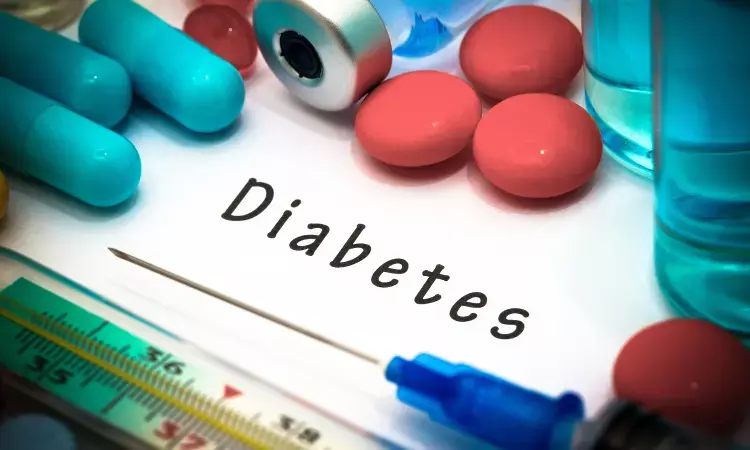- Home
- Medical news & Guidelines
- Anesthesiology
- Cardiology and CTVS
- Critical Care
- Dentistry
- Dermatology
- Diabetes and Endocrinology
- ENT
- Gastroenterology
- Medicine
- Nephrology
- Neurology
- Obstretics-Gynaecology
- Oncology
- Ophthalmology
- Orthopaedics
- Pediatrics-Neonatology
- Psychiatry
- Pulmonology
- Radiology
- Surgery
- Urology
- Laboratory Medicine
- Diet
- Nursing
- Paramedical
- Physiotherapy
- Health news
- Fact Check
- Bone Health Fact Check
- Brain Health Fact Check
- Cancer Related Fact Check
- Child Care Fact Check
- Dental and oral health fact check
- Diabetes and metabolic health fact check
- Diet and Nutrition Fact Check
- Eye and ENT Care Fact Check
- Fitness fact check
- Gut health fact check
- Heart health fact check
- Kidney health fact check
- Medical education fact check
- Men's health fact check
- Respiratory fact check
- Skin and hair care fact check
- Vaccine and Immunization fact check
- Women's health fact check
- AYUSH
- State News
- Andaman and Nicobar Islands
- Andhra Pradesh
- Arunachal Pradesh
- Assam
- Bihar
- Chandigarh
- Chattisgarh
- Dadra and Nagar Haveli
- Daman and Diu
- Delhi
- Goa
- Gujarat
- Haryana
- Himachal Pradesh
- Jammu & Kashmir
- Jharkhand
- Karnataka
- Kerala
- Ladakh
- Lakshadweep
- Madhya Pradesh
- Maharashtra
- Manipur
- Meghalaya
- Mizoram
- Nagaland
- Odisha
- Puducherry
- Punjab
- Rajasthan
- Sikkim
- Tamil Nadu
- Telangana
- Tripura
- Uttar Pradesh
- Uttrakhand
- West Bengal
- Medical Education
- Industry
Artificial pancreas improves blood sugar control after total pancreatectomy: JAMA

Artificial pancreas improves glucose level after total pancreatectomy: Dutch Pancreatic Cancer Group.
According to a recent study published in the JAMA surgery, a randomized clinical trial from the Dutch pancreatic cancer group explored superior outcomes from the Bi-hormonal artificial pancreas (BIHAP) in controlling glucose compared to the current diabetic care, which includes an insulin pump and pen therapy.
Total pancreatectomy makes glucose control challenging due to the complete absence of both alpha and beta cells. The complete lack of glucagon and insulin after pancreatectomy poses a danger to the patient's life due to severe hypoglycemia. A Japanese trial has previously attempted to improve the quality of life of such patients using a hybrid closed loop system. But it includes insulin, not glucagon, and requires manual input of carbohydrate content of each meal. These limitations are overcome in the present trial by using BIHAP.
BIHAP is a portable device containing both insulin and glucagon. It is an entirely closed-loop system with a reactive glucose control algorithm coping with daily variations in insulin sensitivity.
Besselink et al. and the team enrolled 15 patients with a history of total pancreatectomy following cancer. Only ten patients completed all the trial phases. Of the 10 participants, the median age was 62.5 years, with a BMI of 22.63 and a mean diabetes duration of 4.5 years, with surgery performed for more than three months. A 5-day training was given for allocating 7-day treatment with the BIHAP followed by 7-day treatment with the current diabetic care, mostly insulin pen therapy used by eight patients, or the same treatment done in the reverse order.
The key points from the study include:
- The time spent in euglycemia was significantly higher in the BIHAP group (range- 70 to 180 mg/dL), with a median of 78.3 % compared to a median of 57.38 % in the current diabetes care. The P value was 0.03
- In the BIHAP, the time spent with hypoglycemia was lower (< 70 mg/dl) with a P value of 0.004.
- No adverse event of ketoacidosis or severe hypoglycemia was reported.
- One patient experienced nausea, two experienced headaches, and four experienced skin irritation due to the sensor.
- Seven patients wished to continue the BIHAP.
- The patient wished to reduce the number of alarms and the device's size.
The results of the present study show BIHAP as a promising strategy for managing complications after total pancreatectomy. BIHAP reduces diabetes burden and improves glucose levels during daytime and nighttime. However, studies with large sample sizes and longer duration are required to elucidate the results concerning clinical relevance in terms of patients' quality of life, acceptance, and side effects.
References:
Van Veldhuisen CL, et al. "Bihormonal artificial pancreas with closed-loop glucose control vs. current diabetes care after total pancreatectomy: a randomized clinical trial" JAMA Surg 2022;
DOI: 10.1001/jamasurg.2022.3702.
BDS, MDS in Periodontics and Implantology
Dr. Aditi Yadav is a BDS, MDS in Periodontics and Implantology. She has a clinical experience of 5 years as a laser dental surgeon. She also has a Diploma in clinical research and pharmacovigilance and is a Certified data scientist. She is currently working as a content developer in e-health services. Dr. Yadav has a keen interest in Medical Journalism and is actively involved in Medical Research writing.
Dr Kamal Kant Kohli-MBBS, DTCD- a chest specialist with more than 30 years of practice and a flair for writing clinical articles, Dr Kamal Kant Kohli joined Medical Dialogues as a Chief Editor of Medical News. Besides writing articles, as an editor, he proofreads and verifies all the medical content published on Medical Dialogues including those coming from journals, studies,medical conferences,guidelines etc. Email: drkohli@medicaldialogues.in. Contact no. 011-43720751


